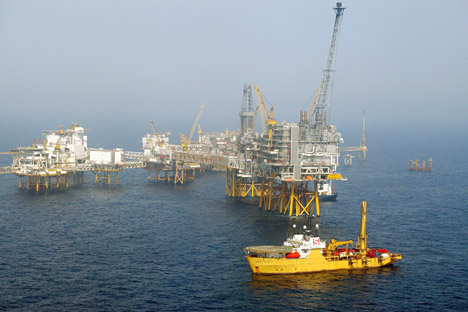
Drilling Platform, E.ON, North Sea, Germany
Press PhotoL1 Energy – the company owned by the founder of Russia's largest financial corporation, Alfa Group, Mikhail Fridman – has bought oil and gas fields in the Norwegian North Sea from the German company E. ON for $1.6 billion, reports Russian business newspaper RBK-Daily
As a result of the deal, which has been already approved by the supervisory authorities of Norway and the European Union, Russian investors have received 43 mining licenses, becoming the owners of the largest oil and gas fields in the North Sea.
"This is the largest transaction conducted by a business under the control of Russian businessmen in recent years," said Ivan Kapitonov, associate professor of the Institute of Civil Service and Management at the Russian Presidential Academy of National Economy and Public Administration – a research institution close to the Russian government. According to Kapitonov, the deposits will allow L1 Energy to become a major international oil and gas company.

Mikhail Fridman. Source: Press photo
Despite the fact that many Russian companies, including major banks and the oil company Rosneft, fell under the EU sanctions imposed in the first half of 2014 to punish Moscow for its role in the Ukraine crisis, Russia's largest financial corporation Alfa Group, owned by the co-owners of L1 Energy, has avoided this fate, since this measure was taken mainly against state-owned Russian companies.
However, as analysts note, it has become more difficult even for private Russian entrepreneurs to work in the European market. Therefore, except for L1 Energy, investors from Russia have not made such transactions in the energy market in Europe.
The motives of Mikhail Fridman and his partners for making such a transaction were understandable, said Nikita Kulikov, CEO of the consulting company Heads, who explained that the "oil and gas market has somewhat slowed its growth; as a result, many assets have lost much in price and, therefore, have become very attractive.”
Sergei Ilyin, an analyst at Premier, said that "L1 Energy was originally created for investments in the energy sector, and initially focused on foreign projects." According to Ilyin, this is a pretty big deal, considering that Russian companies are now cautious about investing in foreign projects.
Secondly, as Kulikov noted, the transaction is a kind of compensation for Fridman for the forced sale of North Sea gas fields owned by L1 Energy to the Swiss chemical company Ineos, a transaction made under the pressure of the UK's Department of Energy.
L1 Group was established by Alfa Group's shareholders in June 2013 after the sale by Russian state company Rosneft of its stake in the joint venture TNK-BP – Russia’s largest oil company with British capital. For their share, the future founders of L1 received $13.86 billion.
In March 2015, Fridman's group bought the German group RWE’s British division DEA UK for $5.8 billion. However, before the closure of the transaction, the UK authorities stated their objections to the deal and demanded that the Russian investors sell oil and gas fields located in the North Sea.
As explained by the British government, entrepreneurs might be included on the EU sanctions list in the future, which would jeopardize the production of hydrocarbons.
Eventually, it was announced on Sept. 11, 2015 that L1 had sold a stake in its British fields to the Swiss chemical company Ineos. According to Reuters, the company expected to receive $1.2 billion for these assets, but the maximum amount offered for the deposits was $750 million.
All rights reserved by Rossiyskaya Gazeta.
Subscribe
to our newsletter!
Get the week's best stories straight to your inbox